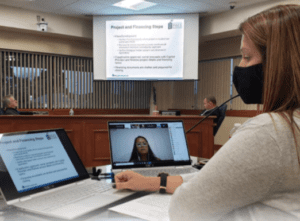Who is a member?
Our members are the local governments of Massachusetts and their elected and appointed leadership.

The Franklin Town Council holds a hybrid meeting. (Photo courtesy town of Franklin)
On July 16, Lt. Gov. Karyn Polito, as acting governor, signed legislation to extend key pandemic-era accommodations, including remote local government meeting authorizations, through March 31, 2023.
The House and Senate had passed the bill on July 14, with an emergency preamble that allowed it to take effect immediately once it was signed. Polito signed the bill in her role as acting governor because Gov. Charlie Baker was out of state.
Cities and towns again have the option to hold public meetings remotely or in a hybrid format, following the same guidelines that have been in place since the COVID public health emergency was first declared in March 2020. The previous extension of the remote meeting authorizations expired on July 15.
Chapter 22 of the Acts of 2022 also includes the following pandemic-related provisions and authorizations related to public boards and town meetings, all of which were MMA priorities for this year and are now extended through March 31, 2023:
• Open town meeting quorums: The bill would allow select boards, in consultation with their town moderator, to lower quorum requirements for open town meetings to not less than 10% of the existing quorum level. The quorum provision includes a seven-day notification requirement before any select board vote.
• Remote representative town meetings: The bill would permit representative town meetings to once again have the option to meet remotely, if approved by the select board and town moderator, as well as the town meeting when it meets.
In May, the Senate had included a remote meeting extension in its fiscal 2023 state budget as an outside section, but with the July 15 expiration approaching and the state budget tied up in negotiations, the Senate advanced the language as a standalone bill on July 5.
The House passed an extension bill on July 7, but the House version included language that would have created a permanent mandate for remote access to all public meetings, aside from those in executive session, with a provision requiring remote participation by the public if public participation is allowed or required at the meeting. The mandate would have gone into effect on April 1, 2023.
The MMA worked with its members and stakeholders across the Commonwealth to clarify that, despite the good intentions of the House bill, such an unfunded mandate presented unworkable financial, technological, logistical, and practical challenges for cities and towns. The Legislature took these concerns seriously and removed the mandate from the bill.
The MMA will continue to push for a permanent solution that gives municipalities the flexibility and funding they will need to expand participation and engagement through remote and hybrid meetings.